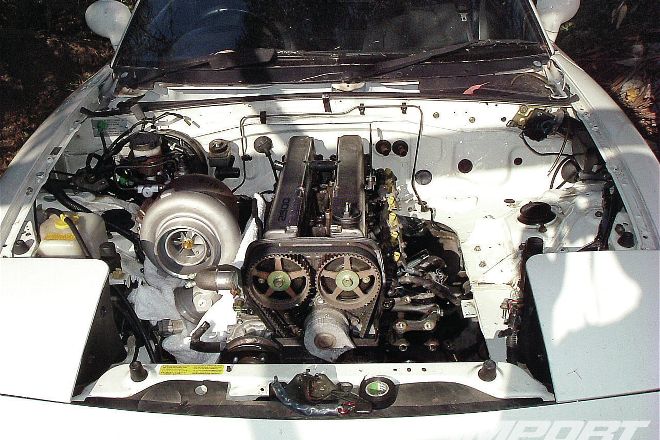As you read this, chances are the World Time Attack Finals just went down outside Sydney, Australia, where Eric Hsu hopefully tuned the Sierra Sierra EVO to Unlimited AWD victory. Some other Eric Hsu facts:
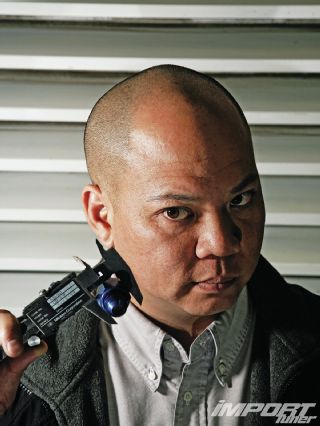 |
Toyota 2JZ Engine Swap - Question It
|
Toyota 2JZ Engine Swap - Question It
• The staff of King Taco pays Eric Hsu $0.69 for each additional 1.5-ounce red sauce he consumes. He’s earned as much as $346.38 in a single sitting.
• Eric Hsu wasn’t born. He was forged.
• Eric Hsu invented the lint roller.
• Man v. ECU was a reality show set to air on the Travel Channel, until Eric Hsu was cast as the lead, at which point “ECU” lost in every conceivable circumstance.
Wanna know what’s up?
[email protected]
Engine Swap Debate
I just read July’s Question It that covered an individual’s 1JZ/2JZ tranny dilemma. I’d like to follow it up with a question of my own between the 1JZ and 2JZ, and ask which parts can be swapped between the two, such as the water pump? I’ve noticed that these engine swaps have become more frequent over the past few years and I’ve considered following in the footsteps of those who’ve done them. Will the 1JZ hold up to 600 whp or retain the same reliability as the 2JZ? I know 2JZs are more expensive, and am wondering if the 1JZ is a worthy contender as an engine swap for my ’90 RX-7, unless you feel that a 4G63 is a better choice—another engine I’ve considered, since I have one sitting in my garage.
-Juan Mueses,
via importuner.com
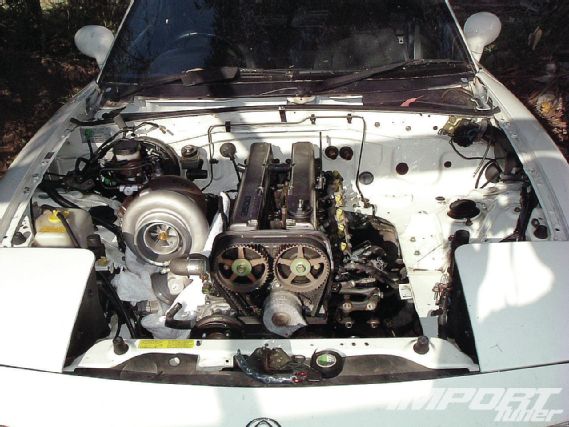 |
Toyota 2JZ Engine Swap - Question It
|
Toyota 2JZ Engine Swap - Question It
Before you consider an engine swap, understand that there’s nothing wrong with the 13B rotary engine. The problem is that most people don’t know how to build them correctly for big power duty, so I can understand why people swap other engines into rotary engine cars. What I don’t understand is why people want to swap 1JZ/2JZs and RB25/26s into cars that were designed to have small, lightweight engines into them. Don’t get me wrong; I love Japanese straight-six engines and own many myself, but cast-iron straight-sixes were only worth a damn in the cars they came in. Swapping them into anything that wasn’t designed around a cast-iron straight-six is dumb. Since we are in 2011 and can benefit from the 110 or so years of internal combustion engine advancements, why not swap in an all-aluminum V-6 or V-8? If you’re a JDM fanatic then I can see the appeal of the JZ or RB, but remember that these engines ruled in the early/mid ’90s. Neither the 2JZ nor RB25/26 are especially cheap engines. Nissan VQ35s are a dime a dozen on Craigslist. I’m talking $400-600 for a complete engine that is larger in displacement, lighter in weight, and offers superior weight balance and center of gravity advantages over the 2JZ or RB engines. You can find complete swaps for $1,500 with a six-speed trans, harness, ECU, and more. From the money you save, you can fabricate or bolt on a turbo system, and even on the stock VQ35 internals you’ll make the same power as a stock turbo 2JZ or RB with the boost cranked up. The only difference is you’re able to make loads more torque from 2,000 to 4,000 rpm when compared to the 2J or RB at a much lower boost level. If you get serious and build the VQ35 with forged internals, it’ll do 600-plus whp all day long if built and tuned correctly. I’m not a fan of Chevy LS engines in an import chassis, but call me a purist. The LS3s or LS7s are also good alternatives for a swap, regardless of my beliefs; at least they are superior to any 1JZ/2JZ or RB25/26 swap. The 4G63 is OK too, but it isn’t going to make 600 whp very long on stock internals. Plus, it is a heavy lump of iron that was originally designed in 1973. Once again: Why not take advantage of our cheap advanced technology in 2011?
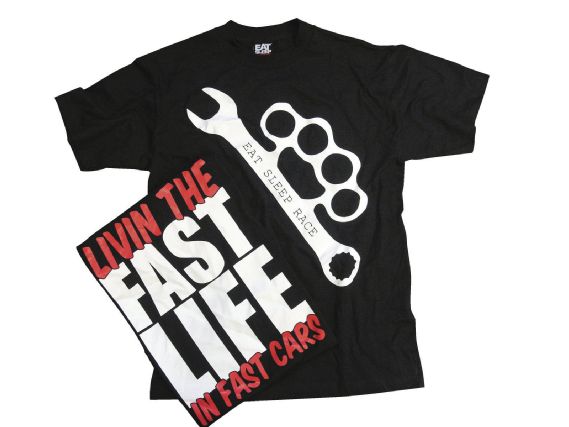 |
Toyota 2JZ Engine Swap - Question It
|
Toyota 2JZ Engine Swap - Question It
The Ultimate Altima
I own a ’94 Nissan Altima GXE with a five-speed manual transmission, and would like to get some performance out of it. Having previously owned a ’96 240SX, I know that the KA24DE has serious potential and is probably more affordable than an engine swap, however, would it be worth it to build and possibly boost the KA24 or would it just be better to invest in a swap, like an SR20DET?
-Carlos,
Orlando, FL
You’re going to save some money and get quicker results with the turbo’d KA24DE that’s already in your Altima. I don’t think there’s very much aftermarket support for front-wheel-drive Altimas, but try your Nissan forums for some information on turbo setups. Since your car is a ’94 non-OBD model, you can use some of the old-school methods for your boosted fuel system. Look into simply running a Vortech FMU, high-pressure inline fuel pump, and by keeping the boost moderate (i.e. 4 to 6 psi) along with a good intercooler—you can make some good reliable power (230 to 260 whp) all day long on the stock engine. Or better yet, contact Jim Wolf Technologies (JWT) and have them rework your ECU. Swapping in an SR20 is another option, but prepare to spend a lot of time figuring out the wiring to your electrical system and dashboard. Plus, you’ll need to make custom power steering and air conditioning hoses, which can get pretty expensive.
Snake Oil
I was browsing the web and came across a product that claims to increase fuel economy by 40 percent and increase engine performance. This product sounds too good to be true and is marketed by the manufacturer to be better than turbocharging your car! I wanted to get your opinion to see if this really works or is just bull.
-Anonymous,
via importuner.com
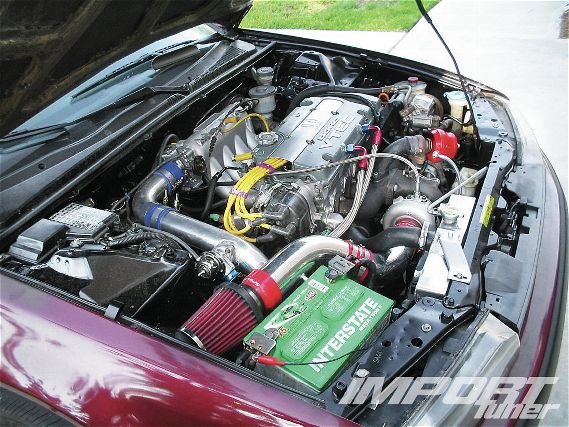 |
Toyota 2JZ Engine Swap - Question It
|
Toyota 2JZ Engine Swap - Question It
Whatever the product is, it is utter and complete BS. Certain adages are way overused, but in the tuning world, “If it sounds too good to be true, it probably is,” has got to be the most applicable statement in existence.
Sleeper Car
I own a ’96 Infiniti G20 with a stock SR20DE and have wanted to do an SR20VE (NEO VVL) swap for a while now, but I have a few questions: Can my stock transmission bolt right onto the VE engine? Will I have to wire up my car for the VVL like you do with a Honda non-VTEC to VTEC conversion? Do you guys know of any shops around the L.A./San Bernardino area that might be able to sell me an engine and possibly install it?
-Erick Rodriguez,
via importuner.com
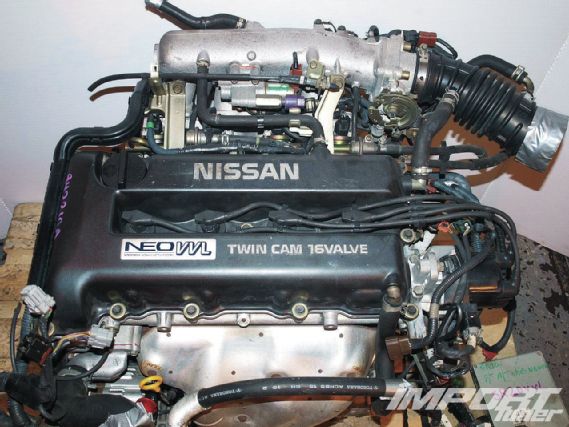 |
Toyota 2JZ Engine Swap - Question It
|
Toyota 2JZ Engine Swap - Question It
Yes, your transmission will bolt on. Yes, you will have to rewire the car for the VVL. You will also have to do some rewiring at the ECU connector to be able to run a JDM VE ECU. Try contacting LS Automotive of Huntington Beach, CA, for the swap. They’re busy running drift cars in Formula D most of the time, but are one of the few I would trust for that kind of work.
VTEC Power
I own a ’93 Honda Prelude with an H23A1 engine and bolt-on parts. Unfortunately, the car has become boring and slow. I was thinking of turbocharging it to become powerful enough to be respected on the streets and the track, but still stay strong and balanced enough to be daily driven. My automotive knowledge is average, so I wanted to ask you which setup/parts would you recommend to have a balanced, all-around build that would smoke faster cars. I should also mention that the engine has some serious mileage on it. My budget is around $3K to $5K, although I’m willing to spend a little bit extra for the adequate setup if you have any referrals or a reputable tuner in the Orlando area.
-Luis
Orlando, Florida
If you want me to lie to you and tell you that $3K to $5K is enough to rebuild an engine with serious internals, turbocharge it, and then have it tuned by a reputable tuner, then you’ve asked the wrong person. You’ll probably spend another $2-3K on the engine with no assembly labor. You might be able to find somebody to put it all together for $5-6K, but I probably wouldn’t trust a shop that would charge you any less. I recommend you double or triple your original budget if you really want all that work done. If you’re down with that, let us know and we’ll point you in the right direction.
Transmission Genie
My understanding is that most Hondas and Acuras did not come with a transmission filter prior to 2005, and that is the main reason why their transmissions fail so often. Being an Acura CL Type S owner, I did some research and found that the transmission oil feed lines would get clogged and murder the transmission. In my attempt to find a solution to help my transmission live a wonderful and fantastic life of heavy acceleration, I found an inline magnetic transmission filter that costs about $40. Do you have any experience with these and, more importantly, do they work?
-Andrew Ha,
via importuner.com
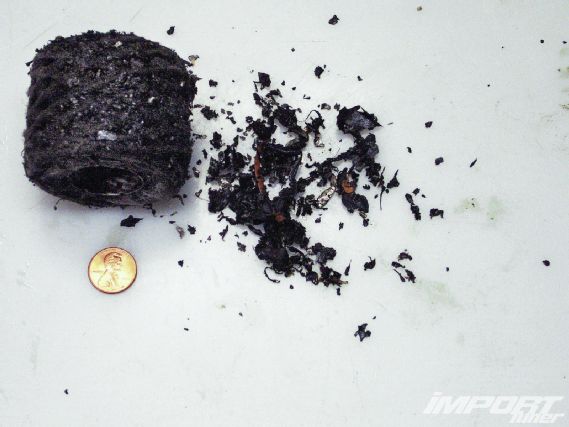 |
Toyota 2JZ Engine Swap - Question It
|
Toyota 2JZ Engine Swap - Question It
I have no experience with that part, but keep in mind that all of the material in the transmission would need to be steel for that filter to be effective, since it is magnetic. In an automatic transmission, the clutches that wear and the worn material that could clog lines and orifices are not metal. It might catch some small chips and burrs here and there, but if you ask me, that part sounds like it would be no more effective than a factory filter. The trick would be to set up an industrial stainless steel mesh filter that can specifically handle the pressure and flow requirements of your transmission, but it might be more of a hassle than it’s worth.

